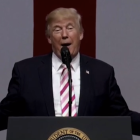In one of a string of early-morning tweets, the president continued his ongoing feud with the National Football League. The president has turned players' protests of systemic racism and police brutality during the national anthem into one of the core issues of his Twitter and media focus over the last several weeks, and Tuesday morning he continued that focus, while also appearing to target the league's tax status.
Why is the NFL getting massive tax breaks while at the same time disrespecting our Anthem, Flag and Country? Change tax law!
— Donald J. Trump (@realDonaldTrump) October 10, 2017
While it's impossible to know exactly what he meant by "tax breaks," it should be noted that the NFL gave up its tax-exempt status in 2015, filing returns as a taxable entity for the first time in 73 years. As we wrote at the time:
The big note in the memo is this: "As you know, the effects of the tax exempt status of the league office have been mischaracterized repeatedly in recent years. The fact is that the business of the NFL has never been tax exempt. Every dollar of income generated through television rights fees, licensing agreements, sponsorships, ticket sales, and other means is earned by the 32 clubs and is taxable there. This will remain the case even when the league office and Management Council file returns as taxable entities, and the change in filing status will make no material difference to our business. As a result, the Committees decided to eliminate this distraction."
As Goodell alluded to, the NFL has operated as an unincorporated nonprofit 501(c)(6) since 1942, with the league office not subject to tax because it does not make a profit. Instead, income was distributed to each of the league's 32 teams, who were taxed on it themselves. The NFL considered itself a trade association made up of and financed by its 32 member teams due to this structure.
Ending the tax exempt status will likely have very little monetary effect on the league itself, especially because the NFL is sure to make some structural changes to limit the tax liability of the league office in reaction to the change.
Ending the tax exempt status will likely have very little monetary effect on the league itself, especially because the NFL is sure to make some structural changes to limit the tax liability of the league office in reaction to the change.
Here's a note from a Reuters article from March about this very subject:
Andrew Delaney, a sports law expert with Martin & Associates, said if it became a for-profit entity, the NFL would likely find enough write-offs to offset the savings it would lose along with its tax-exempt status.
"When MLB made the switch from a non-profit, they reported that there was no real change in their tax liability," he said. "If I were running the NFL show, I'd say, 'This isn't worth it.' It's not worth the PR hit it takes."
It is telling that Goodell referred to the league's tax exempt status as a "distraction," which indicates that the league office was more concerned with the optics and media reaction to it remaining tax exempt than with the actual effects of no longer being an untaxed entity.
It's possible the president is referring to tax breaks received by owners themselves as individuals, but his recently-released tax plan contains several breaks that would be of extraordinary benefit to the owners, such as the repeal of the estate tax, so that seems rather unlikely.






















